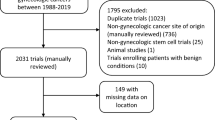Abstract
Background
The clinical trials mechanism of standardized treatment and follow-up for cancer patients with similar stages and patterns of disease is the most powerful approach available for evaluating the efficacy of novel therapies, and clinical trial participation should protect against delivery of care variations associated with racial/ethnic identity and/or socioeconomic status. Unfortunately, disparities in clinical trial accrual persist, with African Americans (AA) and Hispanic/Latino Americans (HA) underrepresented in most studies.
Study Design
We evaluated the accrual patterns for 10 clinical trials conducted by the American College of Surgeons Oncology Group (ACOSOG) 1999–2009, and analyzed results by race/ethnicity as well as by study design.
Results
Eight of 10 protocols were successful in recruiting AA and/or HA participants; three of four randomized trials were successful. Features that were present among all of the successfully recruiting protocols were: (1) studies designed to recruit patients with regional or advanced-stage disease (2 of 2 protocols); and (2) studies that involved some investigational systemic therapy (3 of 3 protocols).
Discussion
AA and HA cancer patients can be successfully accrued onto randomized clinical trials, but study design affects recruitment patterns. Increased socioeconomic disadvantages observed within minority-ethnicity communities results in barriers to screening and more advanced cancer stage distribution. Improving cancer early detection is critical in the effort to eliminate outcome disparities but existing differences in disease burden results in diminished eligibility for early-stage cancer clinical trials among minority-ethnicity patients.
Similar content being viewed by others
References
Newman LA, Hurd T, Leitch M, Kuerer HM, Diehl K, Lucci A, et al. A report on accrual rates for elderly and minority-ethnicity cancer patients to clinical trials of the American College of Surgeons Oncology Group. J Am Coll Surg. 2004;199:644–51.
Newman LA, Lee CT, Parekh LP, Stewart AK, Thomas CR Jr, Beltran RA, et al. Use of the National Cancer Data Base to develop clinical trials accrual targets that are appropriate for minority ethnicity patients: a report from the American College of Surgeons Oncology Group (ACOSOG) Special Population Committee. Cancer. 2006;106:188–95.
NIH Revitalization Act. Public Law 103-43, 1993.
Peterson ED, Lytle BL, Biswas MS, Coombs L. Willingness to participate in cardiac trials. Am J Geriatr Cardiol. 2004;13:11–5.
Beswick AD, Rees K, Griebsch I, Taylor FC, Burke M, West RR, et al. Provision, uptake and cost of cardiac rehabilitation programmes: improving services to under-represented groups. Health Technol Assess. 2004;8:iii–iv, ix–x, 1–152.
Bartlett C, Davey P, Dieppe P, Doyal L, Ebrahim S, Egger M. Women, older persons, and ethnic minorities: factors associated with their inclusion in randomised trials of statins 1990 to 2001. Heart. 2003;89:327–8.
Heiat A, Gross CP, Krumholz HM. Representation of the elderly, women, and minorities in heart failure clinical trials. Arch Intern Med. 2002;162:1682–8.
Alvidrez J, Arean PA. Psychosocial treatment research with ethnic minority populations: ethical considerations in conducting clinical trials. Ethics Behav. 2002;12:103–16.
Miskimen T, Marin H, Escobar J. Psychopharmacological research ethics: special issues affecting US ethnic minorities. Psychopharmacology (Berl). 2003;171:98–104.
Miranda J, Nakamura R, Bernal G. Including ethnic minorities in mental health intervention research: a practical approach to a long-standing problem. Cult Med Psychiatry. 2003;27:467–86.
Gifford AL, Cunningham WE, Heslin KC, Andersen RM, Nakazono T, Lieu DK, et al. Participation in research and access to experimental treatments by HIV-infected patients. N Engl J Med. 2002;346:1373–82.
Hussain-Gambles M, Atkin K, Leese B. Why ethnic minority groups are under-represented in clinical trials: a review of the literature. Health Soc Care Community. 2004;12:382–8.
Leffall LD Jr, Organ CH Jr. Honorary/Sandoz Nutrition Lectureship. Ethics in research and surgical practice. Am J Surg. 1997;174:589–91.
Leffall LD Jr. Ethics in surgical research. Surgery. 1998;123:603–5.
Betancourt JR. Cultural competence—marginal or mainstream movement? N Engl J Med. 2004;351:953–5.
Adams-Campbell LL, Ahaghotu C, Gaskins M, Dawkins FW, Smoot D, Polk OD, et al. Enrollment of African Americans onto clinical treatment trials: study design barriers. J Clin Oncol. 2004;22:730–4.
Simon MS, Du W, Flaherty L, Philip PA, Lorusso P, Miree C, et al. Factors associated with breast cancer clinical trials participation and enrollment at a large academic medical center. J Clin Oncol. 2004;22:2046–52.
Freeman HP, Muth BJ, Kerner JF. Expanding access to cancer screening and clinical follow-up among the medically underserved. Cancer Pract. 1995;3:19–30.
Vargas RB, Ryan GW, Jackson CA, Rodriguez R, Freeman HP. Characteristics of the original patient navigation programs to reduce disparities in the diagnosis and treatment of breast cancer. Cancer. 2008;113:426–33.
McGinnis LS, Menck HR, Eyre HJ, Bland KI, Scott-Conner CE, Morrow M, et al. National Cancer Data Base survey of breast cancer management for patients from low income zip codes. Cancer. 2000;88:933–45.
Stewart AK, Bland KI, McGinnis LS Jr, Morrow M, Eyre HJ. Clinical highlights from the National Cancer Data Base, 2000. CA Cancer J Clin. 2000;50:171–83.
Leitch AM, Beitsch PD, McCall LM, Posther K, Newman LA, Herndon JE II, et al. Patterns of participation and successful patient recruitment to American College of Surgeons Oncology Group Z0010, a phase II trial for patients with early-stage breast cancer. Am J Surg. 2005;190:539–42.
U.S. Census Bureau, Population Division, Population Projections Branch. Maintained by Information and Research Services Internet Staff (Population Division). http://www.census.gov/ipc/www/usinterimproj/ (March 18, 2004).
McKinnon J. The black population in the United States: March 2002. Current Population Reports, Series P20-541. Washington, DC: U.S. Census Bureau; 2003.
Ramirez RR, de La Cruz GP. The Hispanic population in the United States: March 2002. Current Population Reports, P20-545. Washington, DC: U.S. Census Bureau; 2002.
Author information
Authors and Affiliations
Corresponding author
Additional information
This study is conducted on behalf of the Special Populations Committee of the American College of Surgeons Oncology Group. We gratefully acknowledge the bravery and dedication of the cancer patients participating in our clinical trials.
Rights and permissions
About this article
Cite this article
Diehl, K.M., Green, E.M., Weinberg, A. et al. Features Associated with Successful Recruitment of Diverse Patients onto Cancer Clinical Trials: Report from the American College of Surgeons Oncology Group. Ann Surg Oncol 18, 3544–3550 (2011). https://doi.org/10.1245/s10434-011-1818-9
Received:
Published:
Issue Date:
DOI: https://doi.org/10.1245/s10434-011-1818-9




